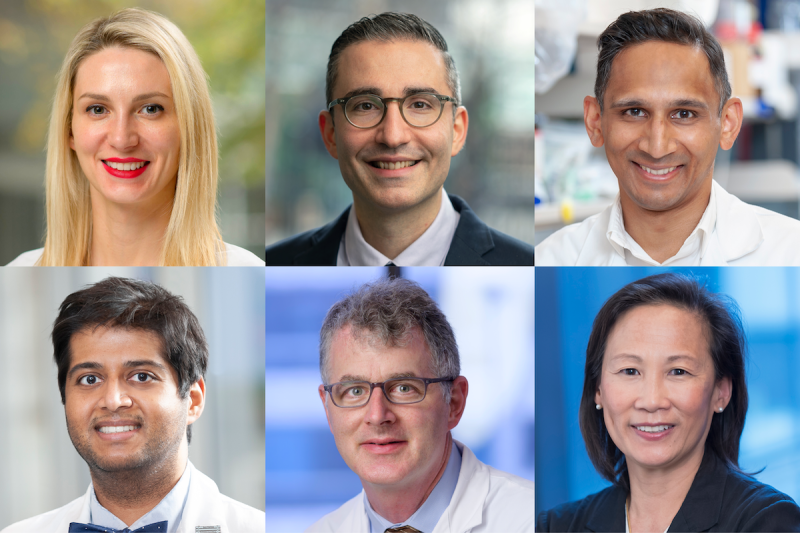
(Clockwise from upper left) Drs. Alina Markova, Michael Scordo, Vinod Balachandran, Katharine Hsu, Tobias Hohl, and Sandeep Raj had their research featured at the 2024 Tandem Meetings co-hosted by the American Society for Transplantation and Cellular Therapy and the Center for International Blood and Marrow Transplant Research.
Doctors and scientists from Memorial Sloan Kettering Cancer Center (MSK) presented advances in transplantation and cellular therapies at a joint meeting hosted by the American Society for Transplantation and Cellular Therapy (ASTCT) and the Center for International Blood and Marrow Transplant Research.
MSK bone marrow transplant specialist and cellular therapist Miguel-Angel Perales, MD, Chief of the Adult Bone Marrow Transplant Service presided over the meeting in his role as 2023-2024 President of the ASTCT. Bone marrow transplant specialist and cellular therapist Alan Hanash, MD, PhD, also served as a Program Chair of the Scientific Organizing Committee. Known as the Tandem Meetings, the event was held from February 21 to 25, 2024, in San Antonio.
Two presentations at the meeting highlighted new ways to improve outcomes for people with blood cancers, including preventing and treating graft-versus-host disease (GVHD), a potentially serious side effect of allogeneic (donor-derived) stem cell transplantation. This type of transplant is used to treat certain blood cancers by replacing a patient’s cancerous cells with donor stem cells, which grow and mature into healthy blood cells.
New Treatment Option for Patients with Chronic Graft-Versus-Host Disease of the Skin
Chronic GVHD most commonly affects the skin, eyes, and mouth, but it can also affect the lungs, joints, gastrointestinal tract, liver, genitals, and other organs. Topical and oral steroids are the most common treatment for skin rashes associated with GVHD, but they can cause side effects and may not fully treat the condition. Immune-suppressing oral medications such as ruxolitinib, ibrutinib, and belumosudil are also used to treat chronic GVHD, but they are not effective for all patients.
Dermatologist Alina Markova, MD, presented the results of a phase 2 study that investigated new ways to deliver ruxolitinib to people with skin GVHD. The trial enrolled 24 participants, most of whom had been treated for acute leukemia or non-Hodgkin lymphoma, who were experiencing persistent GVHD symptoms that did not respond to other treatments. The patients were asked to apply a ruxolitinib cream to one side of their face or body and a non-medicated cream (a placebo) to the other side. After one month, 3-D whole-body photography showed that ruxolitinib cream significantly reduced skin rashes compared with the placebo. One patient experienced a mild headache that was possibly associated with treatment. By performing genomic sequencing, investigators found differences in the levels of expression of interleukin-12, a key protein that regulates the inflammatory immune response, in those who responded to the treatment. These promising results suggest that ruxolitinib cream is a safe and effective treatment option for people with chronic GVHD of the skin.
New Dosing Model Improves Outcomes After CD34-Selected Allogeneic Stem Cell Transplantation
Recent studies have shown that using stem cells with high levels of a protein called CD34 helps to prevent cancer relapse and GVHD in people receiving allogeneic transplants. In a late-breaking presentation, bone marrow transplant specialist and cellular therapist Michael Scordo, MD, shared the results of a phase 2 clinical trial that evaluated how to most effectively use the drug antithymocyte globulin (ATG) in patients receiving CD34-selected transplants. The study looked at whether this approach could improve immune reconstitution — a vital part of recovery for patients who are undergoing transplants. A delay in immune reconstitution by more than 100 days post-transplant has been associated with increased rates of severe side effects and death.
ATG is used to prevent the body from rejecting the new donor stem cells. But giving too much of it can delay immune reconstitution. In this study, investigators used a model-based approach to deliver a personalized dose to each patient, rather than just doing it based on the patient’s weight as it is normally given. The goal was to maximize immune reconstitution and minimize side effects and risk of death.
The trial enrolled 59 pediatric and adult patients with blood cancer who were undergoing their first allogeneic stem cell transplant. Participants received a personalized dose of ATG followed by treatment that included the transplant of CD34-selected donor cells. Of the 56 patients whose outcomes were included in the analysis, the researchers found that about 70% of patients on this treatment plan experienced immune reconstitution after 100 days — results that were considered positive for this patient group. At 18 months after treatment, rates of relapse-free survival and overall survival were 80% and 87%, respectively. The findings showed that for people receiving this type of transplant, using a model-based approach to ATG dosing appears to be beneficial.
Noteworthy Presentations and Awards
Several other investigators from MSK presented research on a range of topics in immunotherapy and stem cell transplantation. Among them:
- Hepatopancreatobiliary surgeon Vinod Balachandran, MD, gave a plenary presentation on recent advances in mRNA vaccine-based immunotherapy. Learn more about these advances.
- Bone marrow transplant specialist Katharine Hsu, MD, PhD, gave a plenary presentation on natural killer cell alloreactivity in a session on selecting an ideal human leukocyte antigen-mismatched donor.
- Infectious disease specialist Tobias Hohl, MD, PhD, gave a presentation on the mycobiome, the diverse communities of fungi in the gut, and its impact on outcomes after hematopoietic stem cell transplantation.
- Bone marrow transplant specialist Sandeep Raj, MD, was awarded the ASTCT New Investigator Award to initiate a project that aims to study how systemic inflammation affects CAR T cell function as predicted by a machine learning model he developed. The goal of this research is to identify patients at high risk of cancer relapse after CAR T therapy and intervene earlier to improve clinical outcomes.


